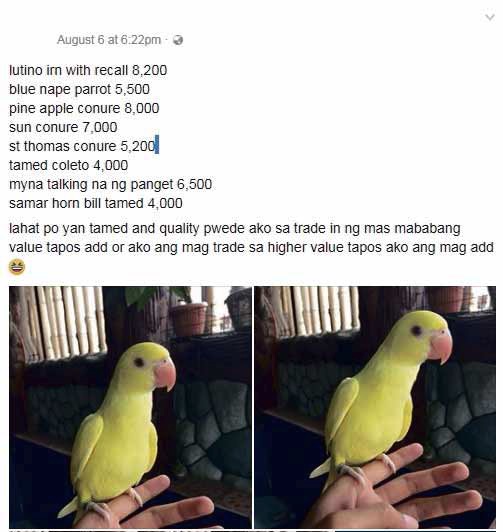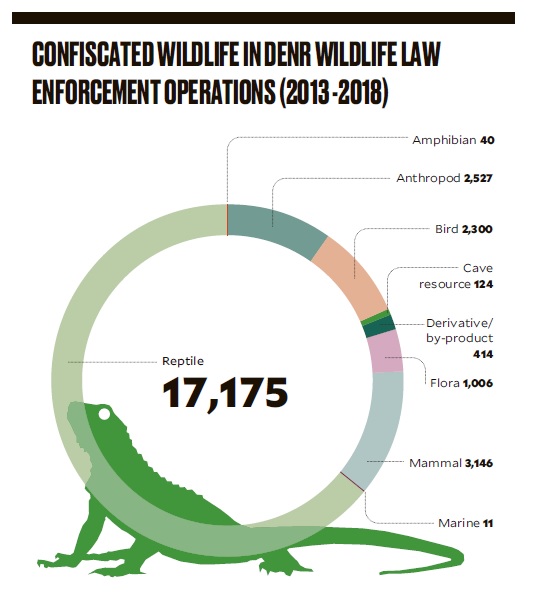
ONLINE DEAL Facebook conversation threads reflect the haggling for endangered species in the illegal wildlife trade. Despite monitoring by environmental officials and private antitrafficking groups, threatened species like the Indian star tortoise (left), monitor lizard (top right) and hornbill (bottom right) are traded like stocks by fly-by-night businessmen . —FACEBOOK SCREENSHOTS COURTESY OF TRAFFIC AND DENR
(Second of three parts)
MANILA, Philippines — In a convenience store near an LRT 1 station in Tondo, Manila, a man carrying two boxes usually reserved for fighting cocks waited for someone in a white shirt to show up.
It was to be their first meeting. All their interactions had been done on Facebook and its app, Messenger, with the final details of their deal later firmed up through text messages.
It was to be a simple transaction: The “buyer,” who was interested in birds — in particular, a pair of brahminy kites locally known as “lawin” and a pair of endangered young hornbills or “tarictic” — would wait in the store. All four birds were to be sold for P16,000.
But the “buyer” was actually a wildlife law enforcer from the Department of Environment and Natural Resources (DENR). He had gone undercover to bag the suspected trafficker, identified by authorities as Ronald de Vera, whose activities they had discovered and tracked online.
At first, De Vera wanted to just watch from a distance while a child handed over the birds and received the money. But the “buyer” persuaded him to appear.
De Vera did, and the exchange of money and birds, including the hornbill hatchlings in a small juice carton, took place. He was promptly arrested by DENR officers and agents of the National Bureau of Investigation.
Unable to show the necessary permits under the wildlife law, he was charged with illegal possession and sale of wildlife.
De Vera, who used a fake name in his social media account, is just one of thousands of wildlife traders operating online.
In the Philippines, transactions involving endangered and threatened species do not even have to lurk in the underbelly of the internet: On Facebook, where 65 million Filipinos are active users, the illegal trade in wildlife is rampant and fairly blatant — and, if lax regulations continue, poised to get worse.
New breed
Government enforcers and wildlife experts agree that the heyday of Cartimar Market in Pasay City and Arranque Market in Manila in the illegal trade of animals and plants is slowly waning, with online marketplaces taking over the business.
While wildlife trafficking already poses a serious threat to Philippine biodiversity, the internet compounds the problem. Facebook, undeniably the largest social networking site in the country, allows new players to easily enter the game.
“What happens online is that it breeds a new generation of traders,” said Emerson Sy of the Philippine Center for Terrestrial and Aquatic Research. “Because of social media, particularly Facebook, illegal traders in the Philippines have multiplied easily tenfold or more.”
Sy, a herpetologist who has closely studied the illegal activity online, said around 90 percent of these traders started out as casual hobbyists or collectors.
“Then they get sucked into the illegal trade, trading illegally caught wildlife because they found out that they can make money off it,” Sy said. “From commonly traded and captive-bred species, they transition to wild-caught and endangered ones.”
With the perceived anonymity offered by online transactions, the trade has taken a new, increasingly menacing face. With no physical shop that restricts their reach, the black markets have expanded, both locally and globally.
“With the internet, all gates are open. Anyone can be your client,” Sy said. He said a number of intercepted packages containing wildlife were heading to countries like the United States, Hong Kong, Malaysia and Thailand, some through online transactions.

PRICE LIST, SALES PITCH Despite Facebook’s own commerce policy against the buying and selling of live animals on their site, the trade is alive and flourishing in many public, closed and secret groups on the social networking site. —FACEBOOK SCREENSHOTS COURTESY OF DENR
Against policies
This illegal exchange occurs despite Facebook’s own commerce policies, which ban the buying or selling of animals. Under Facebook’s rules, live animals, whether livestock or pets, are not allowed in any listings on its site and also on Instagram, which it owns.
Also not allowed are any products from or parts of dogs, cats, or endangered or threatened animals, as well as prohibited animal parts, including but not limited to horn, ivory, organs and bone, among others.
Despite this clear policy, the buying and selling of live animals, including endangered and endemic species, remain rampant across Facebook groups in the country, based on monitoring by government agencies such as the DENR and concerned groups such as Traffic, an international wildlife trade monitoring network.
According to a study published by Traffic in 2018, over 1,000 Filipino traders posted some 2,200 ads in at least 90 Facebook groups, in which over 5,000 different kinds of reptiles were traded within a three-month period in 2016.
The report said various species were sold, including venomous snakes, tortoises and sailfin lizards, many of which were poached for sale in the pet trade—a major threat for Philippine reptiles. Philippine pond turtles and a lone Philippine crocodile were also offered online, even as both species are classified as critically endangered, only a step away from extinction in the wild.
Traffic placed the value of the reptiles at P26.4 million. Sy, who authored the report, said the amount was still a “conservative value,” given the limited number of groups observed.
“For reptiles, the value of the trade is roughly P150 million-P200 million a year. Birds have bigger markets, maybe around P300 million a year,” he said.
Done in secrecy
Facebook’s own design makes it easy for users to create and take down groups anytime, exercise control over what goes on in their spaces, and operate with near-impunity. Some groups are public but others are made private, allowing more scrutiny of their members and ensuring that bogus traders and potential snoops are kept out.
The Inquirer looked into more than 200 Facebook groups identified by enforcers and advocates as having members engaging in the illegal wildlife trade. Of that number, nearly half were found to be “public” (open to all) or “closed” (cannot be accessed by nonmembers). The other half were either secret groups or have since changed their names.
Some were created as far back as 2012, and a handful as recent as this year. Most of the groups have thousands of members and grew by hundreds more in the past 30 days by the end of July, based on the Inquirer’s latest monitoring.
The Facebook groups with the largest memberships were conspicuously named the “official black market” of two different cities in Mindanao, comprising some 110,000 and 45,000 members, respectively. In general, many of the groups’ names state the obvious: either the names of the animals they were trading, such as Burmese pythons, mynahs and cockatiels, or the words “exotic,” “exotic pets” or “exotic keepers” right after the province or city where members claim they are from.
The Inquirer learned that to be part of some closed groups, one is required to answer certain questions, such as animal interests and reason for joining. Those seeking membership are evaluated by the group’s administrators—for example, if they have friends in the same trading circles. At times, a recommendation from a veteran online trader comes in handy.
In these groups, photos and video clips of endangered and threatened animals pop up alongside commonly traded and other species that may be legally bought and sold, as long as there are proper registration and permits acquired from the DENR. Often, the animals are seen inside cages, plastic containers or cardboard boxes.
Some photos even show sellers proudly holding up the wild animal, boasting that it had already been tamed or trained.
As in any other online marketplace, interested buyers are coaxed to communicate via Messenger, where prices are haggled privately and modes of delivery are agreed upon. Enforcers said even payments were not anymore exchanged in person; some use remittances and cash transfers, leaving less of a paper trail for authorities to track.
Changing strategy
According to Esteven Toledo, a wildlife law enforcer with the DENR’s Philippine Operations Group on Ivory and Illegal Wildlife Trade, roughly 95 percent of the illegal trade is done online, leading to new challenges for authorities.
And since trading has become more exposed, more reports on suspected poaching and trafficking also come in, Toledo said. “Before, a concerned citizen would call us to report having personally seen something,” he said. “Now, reporting is much easier: When you see it online, you can just take a screenshot then attach it to an email to us. That’s it.”
What follows is similar to any kind of detective work: surveillance, intelligence-gathering, case-building. But instead of applying for search warrants for raids, enforcers and agents now go undercover online, infiltrating closed and secret Facebook groups.
They filter through thousands of posts, in groups that multiply like viruses, in a painstaking process to weed out those with legal permits to own and trade animals by virtue of DENR-issued certificates and those making money by selling poached, illegally acquired and critically endangered animals.
With no particular unit dedicated to cybersurveillance, these efforts become laborious and take considerable time, allowing criminals faster getaways.
To catch up, environmental law enforcers now undergo training in cybercrime monitoring while working with other enforcement agencies such as the NBI and the Philippine National Police, which have intelligence funds at their disposal.
Who’s to blame?
For Sy, the bigger onus lies on Facebook to regulate its platform in accordance with its own policies.
“They have been turning a blind eye [to this problem] for the longest time … giving the burden to users to report [posts] to them first before they act,” he said.
From hate speech to other controversial content, Facebook has received similar criticism for its refusal to take more responsibility for contents posted and shared on its site, passing the buck to users to flag and report posts for action.
In March 2018, Facebook joined other global giants like Google, Microsoft and eBay in the Global Coalition to End Wildlife Trafficking Online, setting a bold target of reducing the illicit trade by 80 percent by 2020. Among others, they agreed to craft clear, comprehensive and enforceable wildlife trade policies, and to enhance their staffs’ ability to detect illegal products on their respective sites.
But despite Traffic’s published report, Facebook Philippines is still not doing enough to help curb the illegal trade happening in real time in its own backyard, Sy said. The social media giant should cooperate with law enforcement to shut down these groups for good, he said.
Sought for comment, Facebook said that as of April, it had prohibited attempts to sell all animals, save for “brick-and-mortar entities, animal rehoming and adoption agencies, and animal shelters.”
“We are committed to working with the relevant authorities to help tackle illegal online wildlife trade, both in the Philippines and around the world,” a spokesperson said. The Inquirer communicated with Facebook through its media partner in the Philippines and was provided the responses from a spokesperson. No particular official was named.
In the same exchange, Facebook also said it was investing in technologies that could proactively detect and flag content. But for now, user reporting tools were its keys to know about potential violations done in its site.
Meanwhile, it’s business as usual for criminals like De Vera. Since his arrest, he has simply changed his name on Facebook and is active again in trading endangered birds, turtles and mammals.
(To be concluded)
FIRST OF THREE PARTS:
https://newsinfo.inquirer.net/1155025/ph-losing-p50b-a-year-to-illegal-wildlife-trade